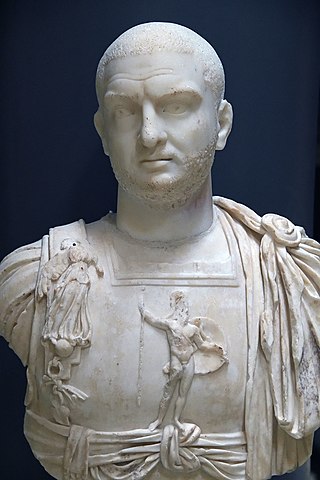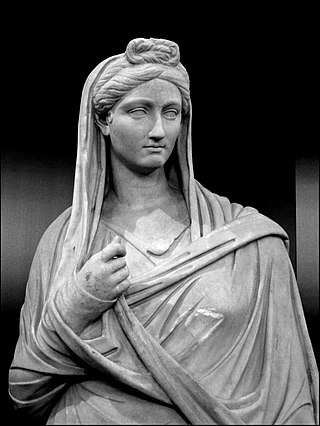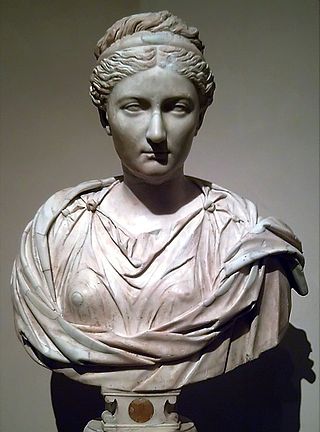Related Research Articles
Year 43 BC was either a common year starting on Sunday, Monday or Tuesday or a leap year starting on Sunday or Monday of the Julian calendar and a common year starting on Monday of the Proleptic Julian calendar. At the time, it was known as the Year of the Consulship of Pansa and Hirtius. The denomination 43 BC for this year has been used since the early medieval period, when the Anno Domini calendar era became the prevalent method in Europe for naming years.

Gaius Vibius Trebonianus Gallus was Roman emperor from June 251 to August 253, in a joint rule with his son Volusianus.

Vibia Sabina (83–136/137) was a Roman Empress, wife and second cousin once removed to the Roman Emperor Hadrian. She was the daughter of Matidia and suffect consul Lucius Vibius Sabinus.

Salonia Matidia was the daughter and only child of Ulpia Marciana and wealthy praetor Gaius Salonius Matidius Patruinus. Her maternal uncle was the Roman emperor Trajan. Trajan had no children and treated her like his daughter. Her father died in 78 and Matidia went with her mother to live with Trajan and his wife, Pompeia Plotina.
GaiusPomponius Graecinus was a Roman politician who was suffect consul in AD 16 as the colleague of Gaius Vibius Rufus. He was probably a novus homo raised to the Senate by Augustus. He was a friend and patron of the poet Ovid, who addressed three letters of his Epistulae ex Ponto to him around AD 10.
Marcus Annius Verus was the paternal grandfather and adoptive father of the Roman Emperor Marcus Aurelius, and father-in-law of emperor Antoninus Pius.
Sextus Attius Suburanus Aemilianus, commonly abbreviated as Suburanus, was a Roman eques who helped Trajan consolidate his position as emperor. Originally procurator of Gallia Belgica, Suburanus was appointed prefect of the Roman imperial bodyguard, known as the Praetorian Guard, in the year 98 and brought this important military unit under Trajan's control. For his achievement, at the end of his command of the Guard, Suburanus was adlected into the Roman senate inter praetores, then held the suffect consulship as the colleague of the consul posterior Quintus Articuleius Paetus in AD 101.
Julia Tertulla was a Roman woman who lived in the 1st century and 2nd century in the Roman Empire. Tertulla was the daughter of suffect consul Gaius Julius Cornutus Tertullus and the identity of her mother is unknown. Tertulla was born and raised in Perga, the capital of the Roman province of Pamphylia. She was the paternal aunt to Gaius Julius Plancius Varus Cornutus.
Gaius Salonius Matidius Patruinus was a Roman Senator who lived in the Roman Empire during the 1st century during the reign of Vespasian.
Libo Rupilius Frugi was a Roman senator and an ancestor of the emperor Marcus Aurelius. He served as suffect consul in 88.
Lucius Vibius Sabinus was a Roman Senator who lived in the 1st century. His daughter Vibia Sabina married the emperor Hadrian.
Lucius Mindius is an unattested Roman Aristocrat who lived in the Roman Empire in the second half of the 1st century. Mindius was a Roman Senator of Consular rank. Little is known on his origins. In 84, Mindius married Salonia Matidia, the niece of future Roman Emperor Trajan, becoming her second husband. Matidia was previously widowed from her first marriage to suffect consul Lucius Vibius Sabinus, who left Matidia a daughter Vibia Sabina.
Lucius Junius Quintus Vibius Crispus was a Roman senator and amicus or companion of the Emperors, known for his wit. He was a three-time suffect consul.

The gens Vibia was a plebeian family at ancient Rome. Although individuals named Vibius appear in history during the time of the Second Punic War, no members of this gens are found at Rome until the final century of the Republic. The first of the Vibii to obtain the consulship was Gaius Vibius Pansa in 43 BC, and from then until imperial times the Vibii regularly filled the highest offices of the Roman state. The emperors Trebonianus Gallus and Volusianus each claimed descent from the family.

Vibia Aurelia Sabina was the youngest daughter and child born to Roman Emperor Marcus Aurelius and Roman Empress Faustina the Younger. She was a sister to Roman Empress Lucilla and Roman Emperor Commodus. Her maternal grandparents were Roman Emperor Antoninus Pius and Roman Empress Faustina the Elder and her paternal grandparents were Domitia Lucilla and praetor Marcus Annius Verus.
Quintus Marcius Barea Sura was a Roman Senator of the first century AD.
Titus Sextius Cornelius Africanus, also known as Titus Sextius Africanus, was a Roman Senator who lived in the Roman Empire in the second half of the 1st century and first half of the 2nd century. He served as an ordinary consul in 112 as the colleague of emperor Trajan.
Titus Sextius Lateranus was a Roman senator active in the second century AD. He was ordinary consul in the year 154 as the colleague of Lucius Verus. Lateranus is also known by a more full name, which has been restored in two different ways: Titus Sextius Lateranus M. Vibius Ovel[lius?...] Secundus L. Vol[usius Torquatus?] Vestinus, or Titus Sextius ... M. Vibius Qui[etus?] Secundus L. Vol[usius Torquatus?] Vestinus.
Lucius Publilius Celsus was a Roman senator as well as a confidant of the emperor Trajan. He was consul twice: the first time as suffect consul for the nundinium of May to August 102 as the colleague of Titus Didius Secundus; the second time as ordinary consul for the year 113 with Gaius Clodius Crispinus as his colleague.
References
- ↑ Paul Gallivan, "The Fasti for A. D. 70-96", Classical Quarterly , 31 (1981), pp. 190, 216
- ↑ Olli Salomies, Adoptive and polyonymous nomenclature in the Roman Empire, (Helsinki: Societas Scientiarum Fenica, 1992), p. 91
- ↑ Anthony Birley, Marcus Aurelius: a biography, Second Edition (London: Routledge, 2000), pp. 241, 242 ISBN 0-415-17125-3, ISBN 978-0-415-17125-0
- ↑ Werner Eck, "Jahres- und Provinzialfasten der senatorischen Statthalter von 69/70 bis 138/139", Chiron , 12 (1982), pp. 336f